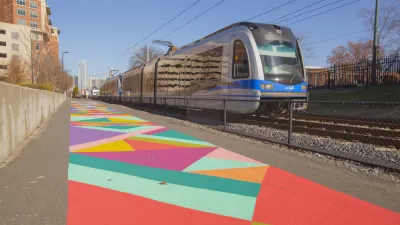The 1.5-mile, $37 million segment of Charlotte's controversial new LYNX Gold streetcar line is set to open July 14. A former mayor, Anthony Foxx, is now the U.S. Transportation Secretary. A federal grant is paying 68 percent of construction costs.
According to a June 4 announcement by the city, the long-awaited trolley line will open today, reported Jason Foster for the charlotte agenda. While I didn't spot an announcement of the opening in the Charlotte-Area Transit System (CATS) website, it did show a Gold Line Facebook Contest that begins today. Keith Lang also reports that Secretary Anthony Foxx will be in Charlotte for today's ribbon cutting ceremony.
A picture of a replica streetcar on a test run on July 9 appears in The Charlotte Observer. "CATS eventually wants modern streetcars that would be similar to the cars that operate on the [LYNX Blue] light-rail line, writes Steve Harrison. "For now, CATS will use three replica cars."
Replica streetcars are new cars designed to look like historic or vintage cars. While they can be found on many historic streetcar systems today, "(s)ince 2007, sales of new replica cars have fallen off noticeably, as market attention has turned to modern streetcar vehicles," according to RPR Consulting.
"Phase 2 extends the Phase 1 streetcar alignment by 2.5 miles on the east and west ends, creating a system that extends 4 miles.," according to the city's description of the LYNX Gold Line. When complete, it will be 10.5 miles costing $126 million. The city manager hopes federal funding will cover 50 percent of the costs.
Harrison writes that "the streetcar has met even more opposition than the Lynx Blue Line and has stayed controversial since the City Council first debated paying for the Gold Line in 2009."
The line may have played a part in the resignation of Charlotte Mayor Patrick Cannon. The current mayor, Daniel (Dan) Clodfelter, was appointed by the City Council on April 7, 2014.
"Proponents say it will bring economic development to low-income areas, and they cite the success of the Lynx Blue Line in attracting riders," writes Harrison, while opponents "note that unlike the light-rail line, the streetcar doesn’t offer riders faster service than the buses that operate there."
FULL STORY: City envisions network of streetcar lines

Maui's Vacation Rental Debate Turns Ugly
Verbal attacks, misinformation campaigns and fistfights plague a high-stakes debate to convert thousands of vacation rentals into long-term housing.

Planetizen Federal Action Tracker
A weekly monitor of how Trump’s orders and actions are impacting planners and planning in America.

In Urban Planning, AI Prompting Could be the New Design Thinking
Creativity has long been key to great urban design. What if we see AI as our new creative partner?

King County Supportive Housing Program Offers Hope for Unhoused Residents
The county is taking a ‘Housing First’ approach that prioritizes getting people into housing, then offering wraparound supportive services.

Researchers Use AI to Get Clearer Picture of US Housing
Analysts are using artificial intelligence to supercharge their research by allowing them to comb through data faster. Though these AI tools can be error prone, they save time and housing researchers are optimistic about the future.

Making Shared Micromobility More Inclusive
Cities and shared mobility system operators can do more to include people with disabilities in planning and operations, per a new report.
Urban Design for Planners 1: Software Tools
This six-course series explores essential urban design concepts using open source software and equips planners with the tools they need to participate fully in the urban design process.
Planning for Universal Design
Learn the tools for implementing Universal Design in planning regulations.
planning NEXT
Appalachian Highlands Housing Partners
Mpact (founded as Rail~Volution)
City of Camden Redevelopment Agency
City of Astoria
City of Portland
City of Laramie




























